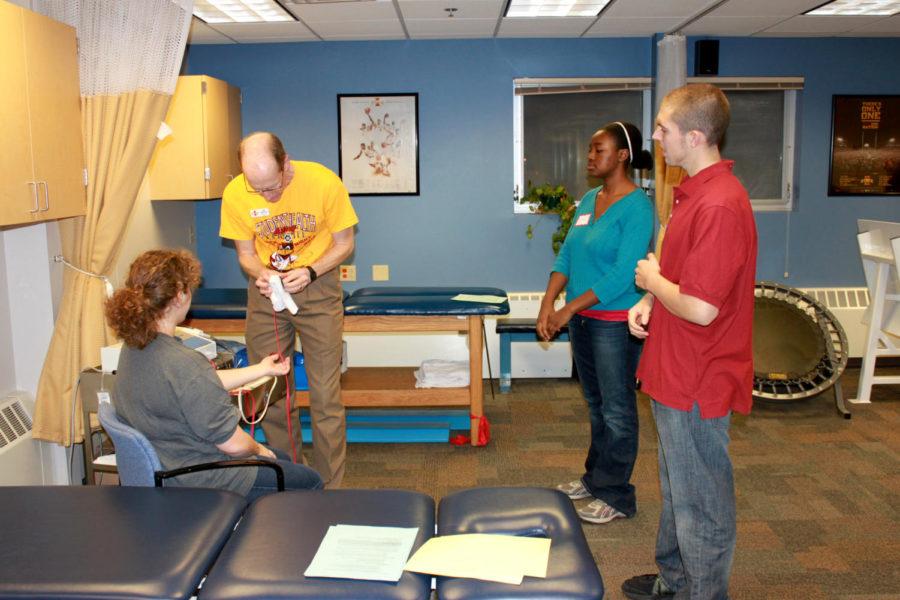Student health fee will increase to improve mental health care
Photo: Kristine Roush/Iowa State
Jim Nespor, physical therapist, demonstrates to students during a mock clinic trial Wednesday, Nov. 7, at Thielen Student Health Center.
January 24, 2017
Student fees will increase by $12 in July for the student health cost to expand mental health services at Thielen Student Health Center and Student Counseling Services.
In August, the Health Center and Student Counseling Services presented at the Student Government and Graduate and Professional Student Senate meeting in order to inform the student body. The Board of Regents approved the student health cost in December.
“We are trying to work to be a leader in how student health and student counseling provide mental health care,” Erin Baldwin, director of the health center, said. “I think the most exciting thing is the interest and engagement that the student body has had. They are saying, ‘tell us more’ and ‘let us help you market our services.’”
Cole Staudt, Student Government president and senior in political science, was one of several students who asked for an increase so the health services could expand mental health care. After speaking with his counterpart at the University of Iowa in the spring of 2016, they both recognized a need for mental health services on their respective campuses.
“In my role, I’m very sensitive to the student fees and increases, but this is something that is absolutely essential for our community,” Staudt said. “We’ve seen students who commit suicide. We’ve seen students who drop out of school because they struggle with depression or anxiety and we just don’t have the resources all the time to help the students. This is something that’s worth the investment.”
Staudt approached Martino Harmon, vice president for student affairs, about where the university was in the process of extending mental health services.
Harmon explained to Staudt that the idea was on their radar, but it would be at least another year before they proposed it.
“I pushed it and said, ‘We need this now,’” Staudt said. “We need more counselors. We need more psychiatrists. We need more capacity in our system for mental health because … last spring or so they had a wait time up to six weeks, and that was not OK.”
Based on the request, Baldwin and her colleagues developed a proposal for the student fee committee. The student fee committee is made up of university leadership and student representatives. They approved the proposal to raise the fee in order to provide more services.
“[The proposal] took a lot of analysis,” Baldwin said. “It was really important for us that students understood specifically what the money was going to fund.”
The current cost is $108 per semester, but it will increase to $120 starting in July. This will fund the salary and benefits to hire a psychiatrist, a mental health nurse practitioner and a registered nurse at the Health Center. The funding also will support three psychologists at Student Counseling Services. The semester increase of $12 totals to $817,680.
The Health Center is primarily funded by the student health fee, while Student Counseling Services is completely general funded.
“This will be the first time that the student health fee will go to fund not only services at Student Health but will help pay for services at Student Counseling,” Baldwin said.
Baldwin encourages network recruitment, which means employees at the Health Center are asking people they know in their field to apply.
“These are such hard positions to recruit for,” Baldwin said. “There’s such a shortage in Iowa and nationally.”
Dr. Carver Nebbe explained that the shortage of mental health providers can come from a production shortage. The University of Iowa is currently the only psychiatric residency in the state.
“Many of those [mental health specialists] get hired out of state because honestly, there’s a lot more money out of state,” Nebbe said.
















